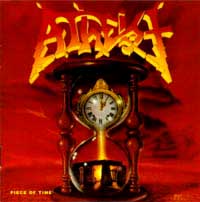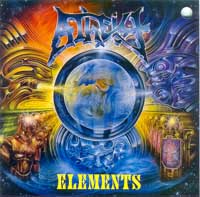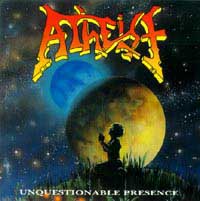Atheist
Groundbreaking jazz/death metal fusion group from the late 1980s to early 1990s who are responsible for inspiring much consequent growth in progressive metal of multiple subgenres. Remains clear- and fresh-sounding to this day; highly recommended.
Piece of Time
Music for Nations
|
1990
|
|
|
Production: Thin film of clear glass enhancing depth.
Review: Putting to work the harmonic theories of jazz within the context of metal structure as expressed in rhythm and phrasing shape with a relative centralism of tone, Atheist render an epic of vast technicality and maturity but more so: they inject a poise of artistic intensity and a value to communication which matches their concept in rejecting established value in favor of immanent values derived from a value in life and nature, as their lyrics reveal.
Tracklist:
1. Piece of Time (4:30)
2. Unholy War (2:19)
3. Room With A View (4:06)
4. On They Slay (3:39)
5. Beyond (3:00)
6. I Deny (4:01)
7. Why Bother (2:55)
8. Life (3:09)
9. No Truth (4:30)
Bonus tracks:
10. Undefiled Wisdom (4:30)
11. Brain Damage (4:50)
12. On They Slay (4:06)
13. Hell Hath No Mercy (2:59)
14. Choose Your Death (3:18)
15. No Truth (4:11)
Length: 56:05
|

Copyright © 1990 Music For Nations
|
Pure in its sheen of metal riffing textures etching shapes in circuit boards of time meted out by evenly-paced but well interbalanced drumming and a use of rhythmic expectancy in intelligent breakdown variations of the obvious interruptions, Atheist indulge jazz theory in their soloing, rhythmic and structural tendencies, allowing wandering melody to converge suddenly back into theme in the style of metal but simultaneously building it in harmony and counterpoint theme internal to motif, using flexible chord voicings and a tension of pocket drumming to power their work. Similar to jazz, harmony defines the space in which structure moves, yet a metallic voice reaches out in tendrils of riff shape alluding to structural synchronization more than ambient tonal symmetry. Threads of instrumentation as in progressive rock are joined by thematic evolution to coincidence of structure, metalizing the tendencies of rock/jazz that minimize narrative power.
Based loosely in speed metal through song structure and rhythmic aesthetic as fused to the larger sense of tempo in song, and fueled by unrelenting speed and precise high-speed double-strumming creating various textures to melody, Atheist form the bulk of their songwriting from intricate lead riffing or precise power and open chording. Grand statements relevant to song are made without becoming lost in projected emotion, as swarming allusions throughout each song fuse in pharses of balance to origin. Violent but varying in that dynamic, and expressing itself metaphorically through mood changes adapted to the inspiration of each song, this music is recognizably progressive without having the slavery to proven form of most jazz/metal mainstream hybrids.
Crashing through interlude and recession before rising again in a maelstrom of energy the arching passages of longer phrases and code fragments in budget riffs communicate a resurgent life inherent to logic favored over superstition. In this and in its sense of musicality and value sought through the chaos of artistic development, the voice of art present to "Piece of Time" contemplates maturely a history of metal and summarizes it, with the same passion that birthed the genre, in an intensity of multiple directions at once fusing to one.
Demo tracks included on this release show two styles becoming one: a raw death metal intent and a sense of epic riffing and powerful articulation in the speed metal style, with the barest hints of the coming style in the proficiency and creativity of these songs in structure and riff.
|
Unquestionable Presence
Music For Nations
|
1991
|
|
|
Production: Clear window of sound focuses on tone rather than bass-intensity, so this is decent but not very accessible production.
Review:
When jazz broke with blues to allow free-form modality in the context of a harmonic solo, the seeds were sown for a fusion of jazz and classical theory in free jazz, or atonal but structuralist jazz. This same theoretical movement influenced the rise of Slayer-style chromatic melodies, becoming more articulated in the mastwork of Morbid Angel and explained from a jazz purist's view in Atheist.
Using a heavy basis of fusion jazz, Atheist twist high-speed progressive death metal riffs into a series of motifs which as a whole express a melody structurally as a series of themes centrally referent by degree of consonance of modal compatibility with an overall melody. The consequence of this exploratory and ambitious method is a wealth of potential notes and harmonies within which to play, allowing the alacritous expression of a fluid lead guitar style awake to fifty years of blues, jazz, rock and metal yet still alive on its own. Such is a fusion of metal theory sensu Black Sabbath-Judas Priest-Morbid Angel and jazz theory sensu Ornette Coleman, John Coltrane or Thelonius Monk.
Similar to free jazz stylings, here there is a diversity of tonal approach and style including microtonal impressionism as only one of the many innovations in this album including percussion, bass and rhythm guitar interpretations of metal never heard in any form before. What is impressive is beyond even the end result of the art, but how much if understood it expresses about anger and peace as fused opposites in a desire for living: on its lowest levels, organized by instrumentalism vividly aware of itself among its components; on its mediate levels, command performances in vocal, guitar, bass, drums; on its penultimate level, an understanding of the art of a master; on its highest level, a spiritual connection to existential desire for living that is the soul of art's gift.
Lyrically, this album manages impressive feats of logic that while conversational are not dogmatic, sung in a middle- to higher-end growl that manages much of the same range and tonality as a 1992-era Burzum vocal without as much incomprehensibility (after a listen or two, most lyrics can be understood). Further exploration than technical is truly an artistic realm, as one can be satisfied alone with some of the most impressive progressive playing in metal's history, but what places this album within the pantheon for this reviewer is its free-spirited will to be a metal band that used its vision to expand the whole of the art.
|

1. Green (3:21)
2. Water (4:27)
3. Samba Briza (1:57)
4. Air (5:32)
5. Displacement (1:23)
6. Animal (4:10)
7. Mineral (4:32)
8. Fire (4:36)
9. Fractal Point (0:43)
10. Earth (3:41)
11. See You Again (1:16)
12. Elements (5:35)
Length: 41:43
|
Elements (Metal Blade 1993)
Trying too hard to mix mainstream-recognizable progressive jazz into their metal, Atheist make an album that is a mix between intelligently shredding metal and something like Phish, complete with the quirky randomness and other humorous self-referentiality that makes for excellent jazz but tragically poor metal. Structuralism is established and broken in favor of clever but evident detours, and heavy use of harmony for textural playing unrelated to core themes makes metal instrumentalism fit unevenly into atmosphere and motif. While all of the instrumentalism is top-notch and far more creative than, say, the average jazz fusion band, the essential spirit of metal is missing along with the focus this band once wielded.
|
BLACK | DEATH | HEAVY | SPEED | THRASH | GRINDCORE
Copyright © 1988-2004 the Dark Legions Archive
|



